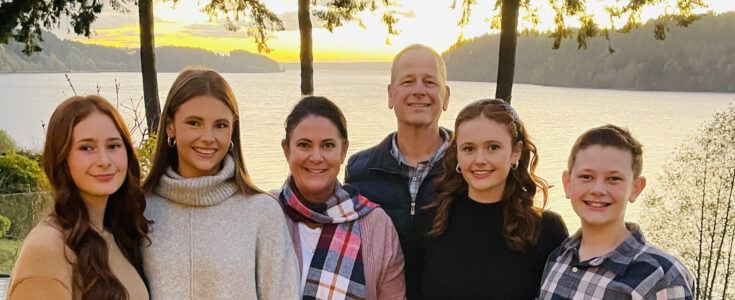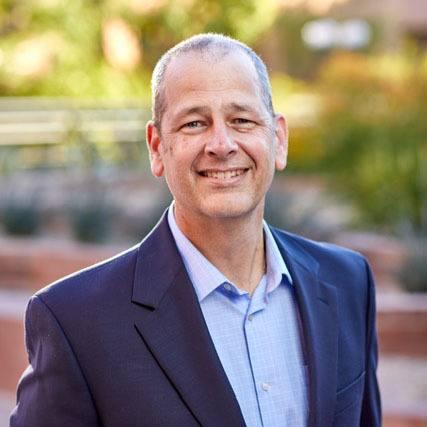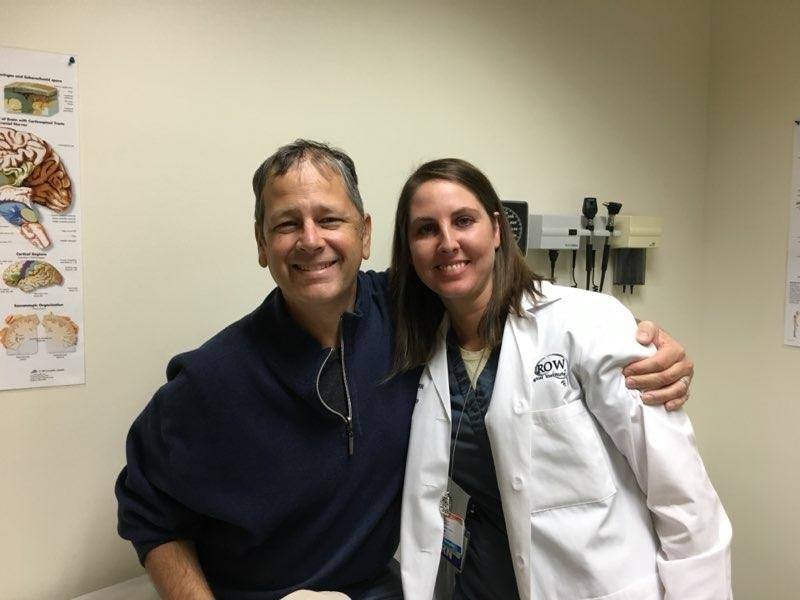
Ivy Blog
A Mental Mindset for Brain Cancer
- March 27, 2024
- Ivy Center
- Posted in Patient Stories

Imagine a long, wooden dock jutting out into the water of a serene lake. Two beautifully crafted teak Chris-Craft boats sit on either side of the dock. Each boat represents a path that leads to an outcome. You must throw your belongings in and choose one wholeheartedly. You cannot keep one foot on the dock and the other in a boat.
For Jeff Staudt, this scenario reflected the decision he faced upon receiving a brain tumor diagnosis. One boat represented a surrender to the diagnosis and an end date circled on the calendar. The other boat represented life and the ability to overcome any challenge put in front of him.
“You’ve got to set your mindset right then and there,” he says. “I have to beat this. I’m too young. I’ve got a wife and four kids. I’m going to be an anomaly.”
Jeff believed that would be his fate. There was no other way, he says. He made that pivotal decision eight years ago when he was diagnosed with glioblastoma, the most aggressive and deadly brain tumor. Unfortunately, according to statistics, most people with this diagnosis survive just eight to 18 months.
Jeff realizes his story is not the typical outcome for others battling this cancer. He feels lucky and while he admits he doesn’t know all the answers – or even the right questions to ask – he knows mindset matters in this fight.
Glioblastoma symptoms not to ignore

Jeff’s brain tumor story began in late 2015 at the age of 44. His first brain tumor symptoms were short moments of lightheadedness. He would lose his place in a conversation and once had to pull the car over while driving because he thought he was about to pass out.
Finally, it happened again while at home with his wife, Aimee, who insisted on calling 911. Before Jeff could protest much, several firefighters and paramedics walked into their living room. They thought he was having a stroke.
The paramedics transported him to the nearest hospital, where doctors ran several tests and performed an MRI. Jeff remembers feeling fine. He thought all the testing was unnecessary. It wasn’t until a nurse came into his room and asked to pray with him did he think it was something serious.
He was told he had a mass on his brain. Doctors suspected a brain tumor and, most likely, a bad one.
“Is there a good one?” Jeff asked jokingly.
One doctor told him he had 10 months to live and that he’d likely never see another Christmas.
“The stats for this thing, if you allow yourself to look, they’re not exactly uplifting,” Jeff says.
Jeff refused to accept that fate. He needed someone willing to join the fight with him.
“You have to choose whether or not you absorb that,” he says. “You have to decide which boat you’re on.”
He decided to seek a second opinion at Barrow Neurological Institute, where he met Dr. Nader Sanai, a world-renowned brain tumor neurosurgeon and the director of the Ivy Brain Tumor Center. Jeff was quickly scheduled for an awake craniotomy to remove the brain tumor. During surgery and under anesthesia, Dr. Sanai removed a portion of Jeff’s skull to expose his brain. Then doctors woke Jeff up and asked him to name images he saw on a screen – a bicycle, a dog, etc. Dr. Sanai then stimulated areas of Jeff’s brain to see if the stimulation affected Jeff’s recognition of the images. This process helped to identify delicate areas of the brain that Dr. Sanai would be careful to avoid.
Jeff said he remembers telling Dr. Sanai on the operating table that it was a pleasure to meet him and that he had heard of his stellar reputation. “No pressure,” Jeff said.
Jeff was put back to sleep, and the surgery was completed. Jeff was told he continued to talk, telling the surgical team all about his love for Oregon Ducks football and quesadillas.

“With Dr. Sanai, Jacki and the entire team, I felt so cared for and I knew I had the best, most talented people surrounding me and my family,” Jeff says. “Dr. Sanai’s certainty and confidence made me feel capable of fighting this and winning.”
Due to the location of the tumor, Jeff’s care team was concerned that surgery may impact his motor skills and his ability to speak. The awake craniotomy ensured Dr. Sanai didn’t touch those eloquent areas of Jeff’s brain. The surgery was successful, and Jeff didn’t experience any cognitive or physical deficits, and he did not need therapy.
Jeff promised his family he’d be home three days after his surgery to celebrate his daughter’s birthday. Everyone was surprised when he kept his promise.
Mental conditioning to win the fight
Since completing regular treatment, Jeff has gotten regular brain scans to watch for signs of tumor regrowth. Whenever he goes in for an MRI, he jokingly reminds the technicians that he ordered the clean scan.
Humor and positivity are important elements of Jeff’s wellness plan. He believes his brain tumor was a one-time occurrence, a fluke meant to wake him up.
“God wanted me to have a more impactful second half of my life than the first half,” he says.
Jeff is a believer in mental programming to achieve a goal. He believes that his body is capable of healing and keeps a confident and humble mindset. He repeats the following mantra 100 times a day, “I am in perfect health. Thank you, God, for every cell, nerve, muscle, fiber, from the top of my head to the bottom of my feet.”
In addition to mindset practice, Jeff takes anti-seizure medication, uses some natural remedies and follows a ketogenic diet, focusing on high fats, low carbs and minimal sugar. The goal, Jeff says, is to starve the cancer cells of glucose so they don’t come back. Although research to prove this theory is limited, Jeff believes this approach is a spoke on the wheel of his treatment plan.
Jeff hopes to inspire others with a brain tumor diagnosis.
“I have a purpose for being here, I’m going to help people,” he says. “We’re not going to quit. We can beat this.”

This story is for general health information only and is not meant to be used as medical advice, diagnosis or treatment. Please consult your physician or healthcare provider before beginning any treatment protocol or with any questions. This story reflects the health status of this particular patient at the time the story was written and photographs were taken. The patient’s condition may have changed over time.
